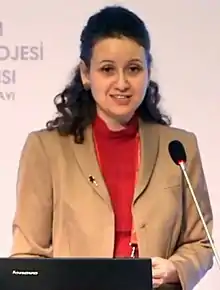Bilge Demirköz
Bilge Demirköz (born 1980) is a professor of high energy physics at Middle East Technical University. She coordinates the Particle Radiation Tests Creation Laboratory, the first collaboration between Turkey and CERN, the European Organization for Nuclear Research.
Bilge Demirköz | |
|---|---|
 Demirköz speaks at the 3rd National Open Access Workshop in Ankara in 2014 | |
| Alma mater | Massachusetts Institute of Technology University of Oxford |
| Scientific career | |
| Institutions | University of Cambridge IFAE Middle East Technical University |
| Thesis | Construction and Performance of the ATLAS SCT Barrels and Cosmic Tests (2007) |
Education and early career
Demirköz is from Istanbul.[1] She attended Robert College for her high school studies. She wanted to take part in research during her undergraduate degree, so moved to Massachusetts Institute of Technology.[2] She won Joel Matthew Orloff Award in 2001.[3] She earned a Bachelor of Science in Physics and Music from Massachusetts Institute of Technology in 2001.[4] She started working on the Alpha Magnetic Spectrometer. She was offered PhD positions in California Institute of Technology, MIT, Stanford University and Harvard University.[2] Despite originally starting her PhD at MIT, the Space Shuttle Challenger disaster resulted in her moving to the University of Oxford.[2] She was a Science and Technology Facilities Council Dorothy Hodgkin Scholar under the supervision of Antony Weidberg. She eventually completed her postgraduate studies at the University of Oxford, and was a member of Balliol College.[4] Here she worked on the ATLAS experiment. When the Large Hadron Collider was delayed, Demirköz tested her detector using cosmic rays.[2] She completed her thesis, Construction and Performance of the ATLAS SCT Barrels and Cosmic Tests, in 2007.[5]
Research
From 2007 to 2009 Demirköz worked as a Trigger Expert for the ATLAS experiment.[6] She was a postdoctoral scholar at the University of Cambridge and IFAE in 2009.[7] At IFAE, Demirköz worked on the jet shapes of 900 GeV and 7 TeV data from the ATLAS experiment.
She joined Middle East Technical University in 2001, joining the Alpha Magnetic Spectrometer experiment on the International Space Station.[7] She founded the Engin Arik Fellowship in 2008, a fund which supports Turkish students at CERN.[8] She was selected as a TED fellow in 2011.[6] She was appointed to the CERN User Advisory Committee in 2011.[9] She 2014 Demirköz has served on the Board of the Arts at CERN. In 2015 she spoke at the Turkish Women's Network.[10] She was elected to the Turkish Academy of Sciences in June 2015. She leads the Particle Radiation Tests Creation Laboratory, the first collaboration between Turkey and CERN. This allows her to study the radiation environment of the earth as well as monitoring the impact of radiation on electronic devices.[11]
Demirköz was named a L'Oréal-UNESCO International Rising Talent in 2017.[12][13] She was promoted to Professor at Middle East Technical University in 2017. She serves as the Principal Investigator of the astroparticle physics group. That year she was nominated to the Global Young Academy.[11][14] She was featured in the 2018 Science Magazine celebration of women in science.[15]
References
- "Bilge Demirkoz". demirkoz.web.cern.ch. Retrieved 2018-10-15.
- "Assoc. Prof. Dr. Bilge Demirköz, Department of Physics, METU". METU - Middle East Technical University. 2013-01-08. Retrieved 2018-10-15.
- "MIT Department of Physics". web.mit.edu. Retrieved 2018-10-15.
- "Phys : Melahat Bilge Demirköz". www.physics.metu.edu.tr. Retrieved 2018-10-15.
- Melahat, Demirkoz, Bilge (2007). "Construction and Performance of the ATLAS SCT Barrels and Cosmic Tests". CERN Document Server.
- "111th ACCU Meeting". CERN Document Server. 2016-02-25.
- "Bilge Demirköz | SU Gender". sugender.sabanciuniv.edu. Retrieved 2018-10-15.
- "ATLAS e-News | Features". atlas-service-enews.web.cern.ch. Retrieved 2018-10-15.
- Sciences, Turkish Academy of. "TÜBA Association Member Associate Professor Dr. M. Bilge Demirköz has been appointed to CERN User's Advisory Committee | Turkish Academy of Sciences". www.tuba.gov.tr. Retrieved 2018-10-15.
- TurkishWIN (2015-01-13), M. Bilge Demirköz | Finding Dark Matter in a Whiteout, retrieved 2018-10-15
- "Bilge Demirkoz". Global Young Academy. Retrieved 2018-10-15.
- "Turkish woman scientist Bilge Demirköz to receive UNESCO grant". Hürriyet Daily News. Retrieved 2018-10-15.
- "The l'Oréal Foundation and UNESCO recognize 15 young women researchers for their outstanding contribution to science". UNESCO. Retrieved 2018-10-15.
- Sciences, Turkish Academy of. "TÜBA Associate Member Assoc. Prof. Demirköz Selected as Member of GYA | Turkish Academy of Sciences". www.tuba.gov.tr. Retrieved 2018-10-15.
- "Let's talk (women in science) - SRI Magazine 2018 - Sunnybrook Research Institute". sunnybrook.ca. Retrieved 2018-10-15.